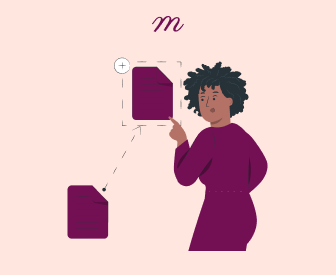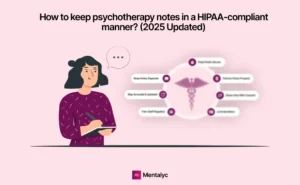In private practice counseling, the first step in getting to know a new client is often through the intake form. This form is like a friendly questionnaire that helps the therapist understand the client's background and what they're seeking help for. A good intake form makes the process smoother and helps the therapist be more prepared for the first session.
Intake Checklist
During an intake session with a new client, a therapist will typically ask a series of questions to gather essential information and gain a better understanding of the client's needs, concerns, and background.
During the intake session, you can ask many questions, and the best ones will depend on the client's issues. Some questions are suitable for any intake session, regardless of the client's problem.

New! Transfer your notes to EHR with a single click. No more copy-pasting.
Here are some common questions a psychologist might ask:
- Why are you here today?
- Have you ever been in therapy or counseling before? If so, please describe your previous
experiences.
- What are your current symptoms or challenges? How long have you been experiencing
them?
- What makes the problems or challenges better?
- Are there specific situations or triggers that seem to worsen your symptoms or distress?
- If you could make anything happen, what positive changes would you like in your life?
- How would you describe your mood overall?
- What do you hope to achieve through counseling?
- Can you provide some background information about your family and upbringing?
- What is your current living situation, and who is in your immediate support network?
- Have you experienced any recent major life changes or stressful events?
- Are you currently taking any medications or receiving medical treatment for any
conditions?
- Do you have a history of mental health diagnoses or treatment for mental health issues?
- Are you experiencing any thoughts of self-harm or suicide?
- How do you cope with stress or difficult emotions? Are there any coping strategies that you've found helpful?
- Do you have any concerns related to substance use or addiction?
- Are there any legal or financial issues that you would like to discuss?
- Are there cultural, religious, or spiritual beliefs that are important to you?
- What are your goals for therapy, and what do you hope to achieve through the process?
- Is there anything specific you would like to tell me about your personal history, experiences, or concerns that you think is important for me to know?
- Do you have any questions or concerns about the therapy process, confidentiality, or what to expect from our sessions?
- Are there any preferences or considerations related to your treatment, such as the type of therapy you're interested in or your availability for sessions?
- What would make you feel more content, happy, and satisfied?
- Can you describe a typical day for you?
- What have you already tried to solve the problem?
- What would you like to get out of counseling? How will you know you are ready to
finish?
- Have you ever been arrested?
Other questions you will ask your clients during the intake appointment:
______________________________________________________________________________
______________________________________________________________________________
______________________________________________________________________________
______________________________________________________________________________
Organizing resources for your intake process can be overwhelming, so using a checklist might help keep everything organized. This checklist can help you gather relevant information to better understand the client's psychological and emotional well-being. Here's a sample intake checklist:
____ Personal Information
- Full name
- Date of birth
- Contact information (address, phone, email)
- Emergency contact information
____ Referral Source
- How did you hear about our services?
- Have you been referred by a doctor, therapist, or another professional?
____ Presenting Issues/Problems
- Describe the main reason for seeking therapy.
- When did these issues start, and how have they progressed?
____ Personal History
- Family background and dynamics
- Educational history
- Employment history
- Marital/relationship history
- Medical history
- Previous therapy or counseling experiences
____ Mental Health History
- Any previous diagnoses or mental health conditions•Current or past medications
- History of hospitalizations or crisis interventions
____ Substance Use
- Alcohol and drug use history
- Current substance use, if applicable
____ Legal or Financial Issues
- Any legal or financial concerns
____ Trauma and Life Events
____ History of Traumatic Experiences
- Recent significant life events or stressors
____ Symptoms
- Specific psychological symptoms (e.g., anxiety, depression, panic attacks)
- Duration and severity of symptoms
- Triggers and coping strategies
____ Social Support
- Current support network (family, friends)
- Relationship satisfaction
____ Goals for Therapy
- What do you hope to achieve through therapy?
- Any specific goals or expectations?
____ Cultural and Spiritual Considerations
- Cultural background and values
- Spiritual or religious beliefs
____ Treatment History
- Previous therapeutic approaches that have been helpful or unhelpful
____ Self-Harm or Suicidal Thoughts
- Any history or current thoughts of self-harm or suicide
____ Consent and Confidentiality
- Discuss the limits of confidentiality and the client's rights
____ Payment and Insurance
- Payment options and insurance coverage, if applicable
Completion of Forms
- Informed Consent
- Records Release (if applicable)
- Online Intake Forms
- Insurance Information (if applicable)
- HIPAA Notice/Privacy Policies
- Other: ________________________________________________________________
- Other: ________________________________________________________________
- Other: ________________________________________________________________
- Other: ________________________________________________________________
You might need more forms or resources; in which case you can add them to this list.
Next Steps
- Discuss the therapy process and scheduling future sessions
This checklist provides a structured way to collect essential information during an intake
session, but it can be customized to fit your specific needs and preferences. It is important to
create a safe and supportive environment during the intake process, allowing the client to share their thoughts and concerns openly.
The intake form is a really important tool in private practice counseling. It helps set the stage for a successful therapeutic relationship by providing the counselor with important insights into the client's needs and background. A well-crafted intake form ensures that the first session can be as productive and comfortable as possible. By taking the time to create a thoughtful and comprehensive form, therapists can better understand and support their clients from the very beginning, paving the way for effective and meaningful therapy sessions.
Why other mental health professionals love Mentalyc

“It takes me less than 5 minutes to complete notes … it’s a huge time saver, a huge stress reliever.”
Licensed Marriage and Family Therapist

“Having Mentalyc take away some of the work from me has allowed me to be more present when I’m in session with clients … it took a lot of pressure off.”
LPC

“By the end of the day, usually by the end of the session, I have my documentation done. I have a thorough, comprehensive note … It’s just saving me hours every week.”
CDCII

“It’s so quick and easy to do notes now … I used to stay late two hours to finish my notes. Now it’s a breeze.”
Licensed Professional Counselor






